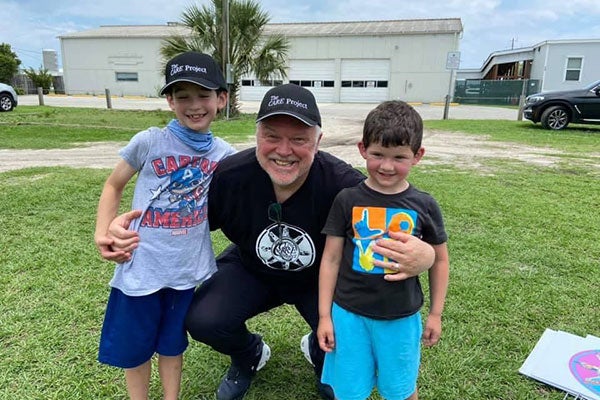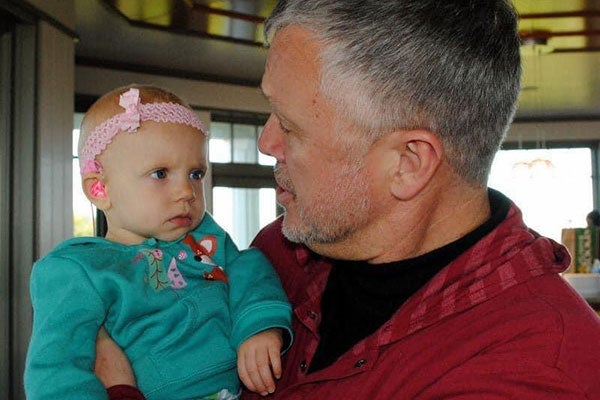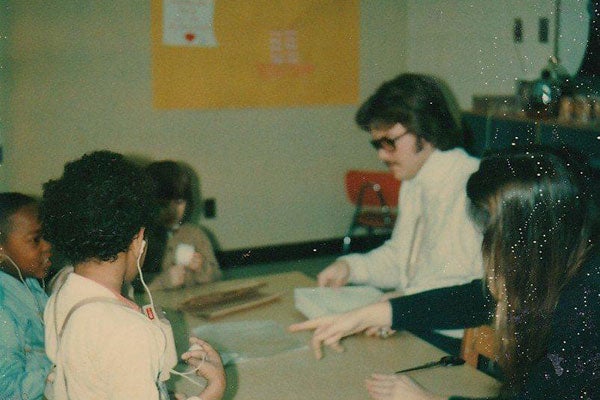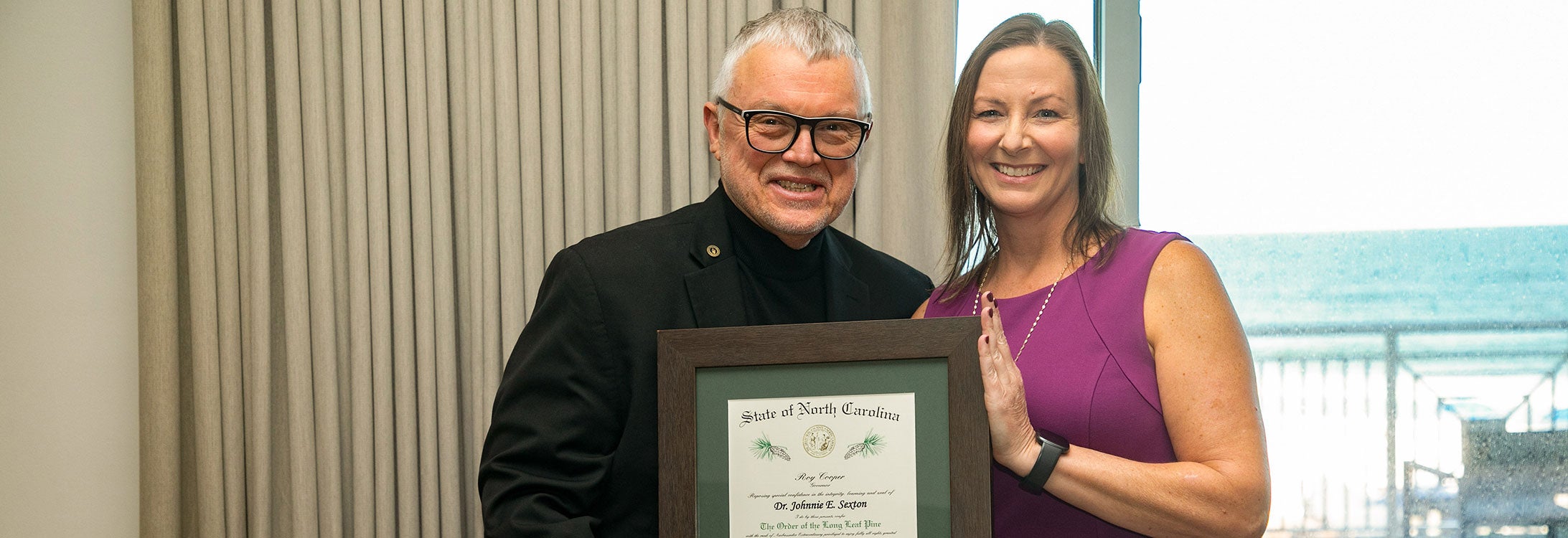Pirate audiologist honored with Order of the Long Leaf Pine
Dr. Johnnie Sexton, an alumnus of East Carolina University’s audiology program, was recently honored with the Order of the Long Leaf Pine, one of the highest honors the state of North Carolina can award for exceptional service to the state and its people.

Pirate audiologist Johnnie Sexton poses with children who have received help from the CARE Project at a family fun day sponsored by the charity. (Contributed photo)
The award was presented by Dr. Sherri Smith, chair of the North Carolina Board of Examiners for Speech Language Pathology and Audiology, during a private reception at Wrightsville Beach Sept. 21. The award honored Sexton’s decades of work in pediatric audiology program development for schools, preschools, infant toddler programs and newborn hearing screening.
The recognition also included Sexton’s pioneering work in establishing the CARE Project, a nonprofit he started in 2009 to assist families of children with hearing challenges.
“I want to congratulate Johnnie on a much-deserved recognition. I am very proud of him and what he’s achieved with the CARE Project,” said Dr. Bob Orlikoff, dean of the College of Allied Health Sciences.
Sexton’s achievements are many, and he gets choked up pretty easily recalling them. It’s to be expected for someone who has a lifetime of memories filled with children hearing their mother’s voice for the first time or learning how to navigate school on their own.
Sexton learned early the profound impacts that being deaf in rural North Carolina can have — for kids and their families. He was born in 1955 in Garland — a town in Sampson County that barely registers on maps — which Sexton said reminded him of Mayberry. A boy, also named Johnny and about his age, was born to a family across the road. The other Johnny was born profoundly deaf, which Sexton remembered being a significant challenge for the whole family.
“At the time, there was only one school for deaf kids, and it was in Morganton. So, he got to come home two or three times a year,” Sexton said. “There were two options: never get an education and stay home or go to the state school for the deaf. His family chose to send him to Morganton,” Sexton said.
“Fast forward to the early 1970s and the federal Special Education Act was passed, and suddenly local communities were required to provide services in the local communities,” Sexton said.
A second school opened in Wilson in later years, which closed the distance families had to travel, but kids were still not with their families.
Having grandparents who navigated the Great Depression and parents who didn’t have many options, Sexton was the first person in his family to graduate high school, let alone college.
“Like any parent, they wanted more for their child. I got lucky and our guidance counselor at Garland High School was an ECU graduate,” Sexton said. “There was another teacher on staff who really wanted me to go to UNC, but the guidance counselor won, so I headed to ECU in the fall of 1973.”
Becoming a Pirate
For a young man raised in the ’50s and ’60s, a career as a certified public accountant seemed reasonable, a good profession. One quarter into his freshman year, Sexton realized he didn’t like business classes and wanted to work with people.

Sexton holds one of the smallest children under his care. (Contributed photo)
“I changed my major seven times, and the dean of General College said, ‘Son, you’ve got to pick one.’ I had just taken the class in what was then called the SLAP Department — speech language auditory pathology — which became CSDI,” Sexton remembered.
ECU’s Department of Communication Sciences and Disorders, or CSDI, is home to eastern North Carolina’s premier center for teaching the treatment of human communication disorders.
During his undergraduate years Sexton volunteered with a class of preschool-aged kids who were deaf and hard of hearing, which cemented his direction forward. And it wasn’t just the kids he felt a growing sense of responsibility for.
“I met mommas and daddies every morning at the door who stayed in the observation room, and we had conversations throughout the morning which gave me a sense of what their daily lives might be like,” Sexton said.
After graduation, Sexton took a position as a speech therapist in the Sampson County school system. In the 1970s, help for deaf and hard of hearing kids remained virtually nonexistent. Sexton said he came to realize that he might be the only professional in the county with the training to help, and even he left ECU without knowing American Sign Language, which at the time wasn’t taught on campus.
“I reached out to Pitt Community College, and I enrolled in night classes. I learned sign language at night so I could work more effectively with kids in the daytime,” Sexton said.
Embarking on Change
After half a year, Sexton returned to ECU to complete a master’s degree in audiology and was recruited to take part in a new program, based in Lenoir County, to provide audiology services for 17 southeastern counties. The program’s organizers hoped to develop a model for how audiology services could be provided in all North Carolina public schools.
When the grant funding ran out in 1981, a time of state and federal funding cuts, Sexton became an unemployed audiologist. At about the same time, contacts he made in business asked if he would be interested in selling audiology technology for deaf children.
“The president of one of those companies, Tad Zelski, called and said, ‘I think I can hire an audiologist who can teach themselves consulting, but I can’t hire a sales guy and make them an audiologist,’” Sexton said. “So, I took the job, packed my car and left Greenville. I cried all the way to Atlanta because I was already homesick.”
What Sexton initially dreaded opened the world to him. He learned about emerging technologies that were making radical change for children with hearing difficulties, and just as importantly, he was able to share what he was finding with his peers in the audiology community back home. But the homesickness wasn’t easing and when he asked to move back to North Carolina, the company agreed to open an office in Greensboro — much closer to home.
Starting business
An out-of-the-blue call from a fellow ECU audiology alum, Linda Beaman, who worked in Duplin County schools, started Sexton down an entrepreneurial path he didn’t know he would relish following. She couldn’t hire him directly, but if he had a business, she could offer a contract to provide those same services. They would be in business.

Johnnie Sexton works with deaf and hard of hearing children in the 1970s. (Contributed photo)
“So, I started a private practice specializing in educational audiology services. I had three counties, and I would get up in the morning and drive three hours to a school, and work, and I’d go home. The next day I’d go in another direction,” Sexton said.
His business grew rapidly: He now employs 16 audiologists who provide critical services in schools across the majority of North Carolina.
While the business has grown, audiology help for children across the state remains a pressing need, particularly in rural areas, he said. Sexton wanted to do more and 15 years ago started the CARE Project, which has vined across state lines to help families across the United States.
Sexton said the CARE project was born of a real need to support families of deaf children, and his volunteers do so with the hope of easing the stresses on families who feel “alone, disconnected and who need a village, a community.”
While the need for support in rural communities is great, the COVID-19 pandemic provided an opportunity for Sexton and his team to extend services where they couldn’t previously.
“It certainly showed us a new way to help. Yancey County is way up in the mountains and I do virtual consults with them. Dare County, the Outer Banks, is beautiful, but it’s multiple hours to get out there,” Sexton said.
Sexton said one developing challenge for his team, and many others who similarly support students with disabilities and developmental challenges, is the recent proliferation of charter schools, which lack the support of a traditional school district organization.
Sexton said he feels very lucky to have arrived at a place where he can change an individual child’s life or be part of systemic change by assisting state government in developing programs like the outgrowth of the 1999 law that mandated all children in North Carolina be screened for hearing problems.
“We can identify hearing loss so much earlier and there are more programs than ever,” Sexton said. “Through the miracle of medicine, children who are fragile at birth, they used to die and now they don’t — they survive. These children are coming up with multiple challenges and greater needs.”
Sexton said the most important part of his work is making people’s lives better. For the past six years he and his team have hosted a family fun day for their clients, usually at the park at Wrightsville Beach and other parks across North Carolina and the U.S.
“Last year a young woman approached us at the park and said, ‘You don’t know me. I just graduated from N.C. State with a degree in engineering. You helped me and my family years ago,’” Sexton recalled.
“To feel like they belonged to something, and that I helped them,” proved to Sexton that he is doing the right work.
Sexton’s husband, Xris Kessler, a filmmaker and artist, has documented the CARE Project’s work, and the families whose lives are changed by interventions. The youngest child Sexton has worked with was 3 months old when he was diagnosed with profound deafness. Through the process of deciding the best path forward for the child, Sexton and Kressler became very close to the young family. Surgeons eventually gave the boy cochlear implants, and when it was time to active the devices, the parents opted for Sexton and Kessler to be in the room when it happened — a clear sign of the connection they had with the family.
“I needed to prove for myself that he’s hearing,” Sexton said. “I used to teach preschool, and I went behind him and just did ‘ba ba ba’ because they’ll hear that if it’s possible. That little baby looked up at me and smiled. It was another one of those moments that I’ll never forget.”
Sexton has proven himself — across a lifetime of service to some of North Carolina’s most vulnerable citizens — to be an embodiment of the Pirate spirt of service. But his humility turned the spotlight back on those at ECU who gave him a chance.
“East Carolina University’s faculty changed my life. They gave me a key to unlock a door and taught me so much when I didn’t even realize it,” Sexton said.
